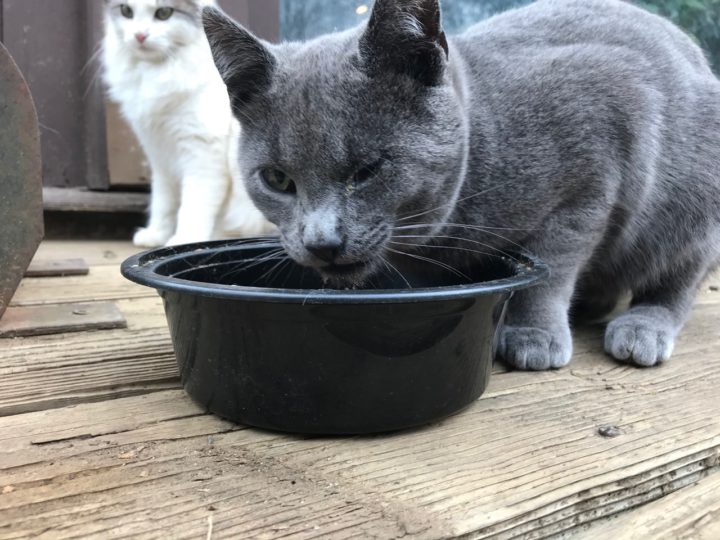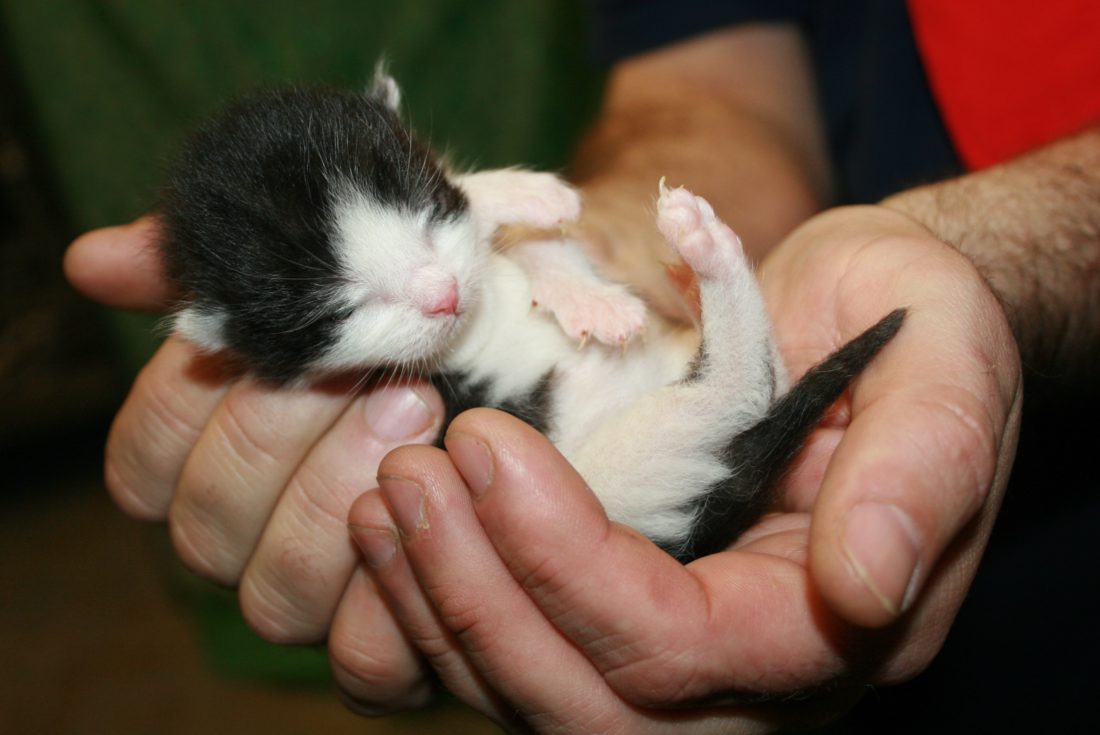Across the Northern Hemisphere, something is in the air. Gardeners are planting seeds. Dresses and skirts are getting shorter. As the first day of spring draws closer, Mother Nature turns her focus to the birds and the bees — and in Buncombe County, to the kittens.
March to October is the feline breeding season, colloquially known as “kitten season.” “Many shelters experience the bulk of their cat and kitten intakes during this time,” says Dr. Karla Brestle, senior director of training and programs for the ASPCA Spay/Neuter Alliance, or ASNA, in Asheville.
While this time of year always reaps bountiful kittens, the past two years have been exceptionally prodigious. In Buncombe County, the COVID-19 pandemic led to strains on local spay/neuter programs as fewer veterinarians performed surgeries on both domesticated cats and ferals. The result was packed shelters.
“I’m worried it’s going to take years to undo the damage of the pandemic,” says Dr. Ann Schneider from OpenDoor Veterinary Care in Asheville. “I don’t know how many cats went unspayed and unneutered because of that, but it’s got to be an enormous number. And now they’re out there reproducing.”
Cat reproduction 101
“Cats are very good at populating and they can populate at a really young age,” says Leigh Craig Fieser, executive director of Brother Wolf Animal Rescue, a shelter that also operates a low-cost spay/neuter mobile clinic.
Cats can go into heat at 4 months old but can be safety spayed or neutered at 2 months, says Brestle. A female cat can birth two-three litters per year and each litter usually has three-five kittens. A healthy cat can live up to 15 years old and hypothetically become mama to 180 kittens during her lifetime, she says.
Left unchecked, the feline population can grow exponentially, so experts recommend that kittens be altered as soon as possible. A significant number of Buncombe County’s high-quality, high-volume, or HQHV, low-cost spay/neuter procedures are done by ASNA, which serves 18 counties in Western North Carolina.
HQHV surgeries are a great resource for the community, says Laila Johnston, donor relations director for Asheville Humane Society. “At your average vet, spay/neuter is very expensive here,” she explained. People who take in an unaltered stray cat often have sticker shock, she said: “‘What do you mean spay/neuter is going to be $350?’”
Through ASNA, spaying a female cat costs $50, while neutering a male cat costs $35, according to its website. Financial assistance from ASNA may be available to those who need it.
The community embraces these services: ASNA performed 14,371 spay/neuter procedures on cats in 2019, according to figures provided by the organization.
‘Record-setting’ babies
The number of spay/neuter surgeries dropped during the COVID-19 pandemic after the U.S. surgeon general recommended the suspension of elective or nonessential surgeries, in part due to the scarcity of personal protective equipment at the beginning of the pandemic. For a time, ASNA stopped surgeries altogether, Brestle said. During 2020, ASNA performed 10,741 spay/neuter surgeries on cats— nearly one-third fewer than the previous year.
Brother Wolf Animal Rescue also scaled back the number of alterations it offered during the pandemic. The nonprofit operated two mobile clinics during 2020, which enabled it to alter 3,136 cats, says Fieser. But during 2021, one veterinarian for its mobile clinic left. “We therefore, sadly, went down to one mobile clinic as we were unable to find a replacement veterinarian at that time,” says Fieser. Still, Brother Wolf Animal Rescue altered 1,336 cats in 2021.
Its mobile spay/neuter clinic runs four days per week — two in Buncombe County, one in Transylvania County and one in Burke County. One veterinarian and two veterinary assistants alter 20-25 animals per day, both cats and dogs. The clinic focuses on house cats (pets) as well as feral cats, Fieser says. (Animals in a shelter are kept in separate kennels for their health, which also prevents them from reproducing.)
Less frequent spay/neuter surgeries have cumulatively translated into more cats — at least at Asheville Humane Society. “Kitten season in 2021 was record-setting for us,” Johnston says. “At the height of summer 2021, we were taking about 65 cats and kittens a day.”
Fieser notes that her shelter is usually full every kitten season, and that remained the same in the pandemic. “Pre-COVID, Brother Wolf was always full of cats,” she says. “During COVID, Brother Wolf was always full of cats.”
Bottleneck
When Asheville Humane Society has a packed shelter, it tends to create a bottleneck for adoptions, says Johnston.
“What happens when we can’t get animals fixed is that it causes a bottleneck between the shelter and the adoption side,” she explains. “Animals are adopted but sitting and taking up space for two weeks because we don’t let people take animals home unaltered.” It never euthanizes animals for space, she says.
Asheville Humane Society doesn’t regularly perform spay/neuter procedures at its facility; instead, medical director Dr. Chelsea Fogal focuses on basic health care for all animals coming in. But during the summer of 2021 when the kitten population peaked, Fogal began neutering male kittens. (It’s easier to perform due to their external genitalia and they don’t require an anesthesia suite, Johnston explains.) During 2021’s kitten season, Fogal performed as many as 22 neuters per week.
Fogal continued to perform neuter procedures in September, October, December and January. “We ideally shouldn’t have that number of pressing needs over the winter,” Johnston says.
Asheville Humane Society took in more than the usual number of cats throughout winter 2021 and 2022, she says. (When the shelter fills, it can relocate animals to partner shelters up north, as well as local shelters.) “We have neonatal cats right now [in February], which is unusual, because theoretically kitten season should be starting next month,” Johnston says. “We should be seeing maybe pregnant [cats]. But in December, we still had 5-day-old kittens, which is unusual.”
In addition to Fogal performing surgeries in-house, Asheville Humane Society also contracted with other veterinary clinics in Asheville to spay and neuter. And Brother Wolf, which also relies on ASNA for its in-house spay/neuter surgeries, contracted with other veterinary clinics as well. Its veterinarian focuses primarily on reaching communities with the mobile clinic, Fieser says.

More vets needed
Controlling the cat population also depends on having enough professionals trained in the procedures. In January, veterinary industry leaders warned the American Veterinary Medical Association that a shortage of veterinarians is “real and growing.”
Spay/neuter surgeries are taught during veterinary school. But Buncombe County also happens to be where ASNA, a nationally recognized training facility for HQHV spay/neuter procedures, is located.
ASNA established a veterinarian training program for HQHV spay/neuter in 2009, and in 2010 it added a veterinary student training program for students in their fourth year of veterinary school. The training occurs on-site at ASNA’s Asheville campus, which has 12 surgical suites.
ASNA trains about 800 veterinarians, veterinary techs and assistants in HQHV techniques each year, says Brestle. It also trained about 480 veterinary students per year prior to the pandemic.
But in March 2020, ASNA temporarily suspended all trainings. “Due to government mandates and to protect our staff and the community, we suspended on-site training for 13 months at the start of the pandemic,” Brestle explains. During the time ASNA suspended its training, its staff performed all the spay/neuter surgeries.
It also shifted its focus to distributing free cat and dog food to WNC animals and providing free urgent veterinary care to 327 pets, Brestle says.
ASNA returned to off-site training at clinics around North Carolina in July 2020 and resumed on-site training for HQHV “at a reduced capacity” in June 2021, Brestle says.
The nonprofit isn’t the only spay/neuter facility that’s been effected. OpenDoor Veterinary Care also is operating with one fewer veterinarian than normal, says Schneider. And its surgery schedule is full. “We’re booked out pretty far,” she says. “I know for sure that if we had more [appointment] times available that we would be able to fill them.”
A look ahead
Buncombe County’s animal welfare organizations work interdependently, and each is trying to do its part to prevent another overpopulated kitten season in 2022.
ASNA has almost returned to pre-pandemic levels of spay/neuter surgeries, performing 14,062 procedures on cats in 2021. “There was significant demand for spay/neuter services prior to the pandemic, and that need has remained consistent,” says Brestle.
Currently, ASNA staff members perform approximately 440 HQHV spay/neuter surgeries per week, she says.
Fieser says Brother Wolf anticipates spaying and neutering 1,600 cats this year. It has performed 351 alteration surgeries on cats as of mid-March.
“I think that folks are a little nervous in the shelter environment,” says Johnston. “What is the summer going to look like?”
She adds, “We’re bracing for another record season.”




Before you comment
The comments section is here to provide a platform for civil dialogue on the issues we face together as a local community. Xpress is committed to offering this platform for all voices, but when the tone of the discussion gets nasty or strays off topic, we believe many people choose not to participate. Xpress editors are determined to moderate comments to ensure a constructive interchange is maintained. All comments judged not to be in keeping with the spirit of civil discourse will be removed and repeat violators will be banned. See here for our terms of service. Thank you for being part of this effort to promote respectful discussion.